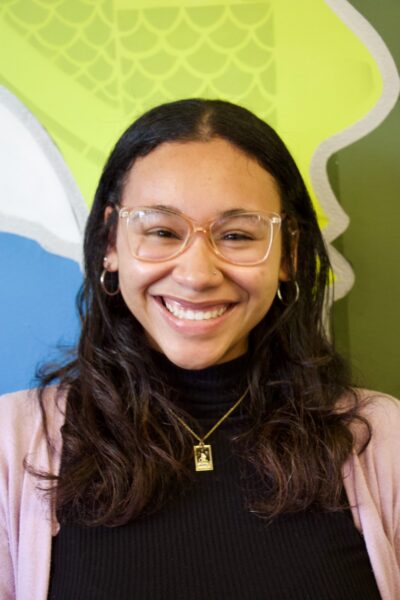From foster care to student body president’s chair, Psychological Sciences student’s Purdue experience highlighted by leadership, brain and behavioral sciences

Shye RobinsonPhoto by Tim Brouk
Written by: Tim Brouk, tbrouk@purdue.edu
Shye Robinson’s journey to become the leader of almost 38,000 Purdue University undergraduate students started with hardship during her adolescence, but her perseverance and academic prowess earned her giant leaps in leadership, involvement and academics.
Now the 2023-24 Purdue undergraduate student body president, Robinson was a foster child growing up in Fort Wayne, Indiana. She was in middle school when she was removed from her biological mother’s care and raised by her neighbors, who provided her with the opportunity to continue flourishing. In high school, Robinson leaned into academics as a member of the National Honor Society and salutatorian of her class. She was active outside of the classroom, participating on the dance team and in theater. Robinson even interned at Parkview Health in Fort Wayne during her senior year.
Four years later, Robinson was elected as student body president while maintaining her studies in brain and behavioral sciences in the Department of Psychological Sciences. Robinson is a Degree+ student in political science with a minor in Spanish and a first-generation college student.
One of Robinson’s proudest achievements so far was initiating the Black Boilermaker Experience, an ad-hoc committee dedicated to sharing the stories and experiences of Black Boilermakers on campus. Her committee’s goal is to create videos to be shared with prospective students in the hopes they will apply to the university.
“It’s about giving back and understanding what Black Purdue looks like,” she explained. “We had less than 1,000 Black undergrads when I started it. Now we have about 1,400. But still, Black students on this campus are one of the larger minority groups. I think Purdue can still be more diverse. I know that people can feel belonging if they see people that look like them. These are psychological principles.”
Graduate school; a career in Washington, D.C.; becoming a civil rights lawyer; or becoming nonprofit organization leader are some of the career goals Robinson is interested in exploring, and the combination with understanding how the human mind works gives her an interesting background built for today’s partisan political landscape.
“I see a big correlation,” said Robinson, noting she’s researched how media bias and information consumption affects political partisanship. “You never unlearn things. If we want to have very good prosocial behaviors, what does teaching others about prosocial behaviors mean? How can you implement something like that into elementary school education? Are there ways we can craft or create a society that isn’t what we have now? How can I make it better for the kids that are going to grow up in this world? Because I know for me and a lot of people in my generation, seeing the political climate right now is very discouraging. People don’t want to participate in politics because it feels as though nothing really matters.”
Inspired by activism
During her senior year in high school, Robinson’s career goal was to be a pediatrician. She earned an internship at Parkview Health where she primarily served in the family birthing center. She observed traditional births and C-sections as well as what nurses go through and the care that patients receive from all hospital staff.
But the volatile political climate in 2020 inspired Robinson to study politics and activism. She brought dual passions for well-being and policy to Purdue.
“I was watching Black Lives Matter, and that was something I had never seen before — that kind of movement,” Robinson said. “I had wanted to become a pediatrician because I’ve always wanted to serve others. That’s always been a driving, key force in my life: to help people.”
One of her early classes, PSY 12000 (Elementary Psychology), inspired her to add psychology to her political science degree.
“I found what I learned in that class was super engaging for me,” Robinson said. “Brain and behavioral sciences is more geared toward the more scientific aspect of psychology. … It opened my eyes to another graduate school option.”
‘Shye’s Not Shy’
While thousands of Purdue students look up to her, they can also hear Robinson monthly on her podcast, “Shye’s Not Shy,” where she explores a variety of political, sociological and psychological issues that pique her interest while also interviewing guests.
“It’s an outlet where I can teach others about what I’ve learned myself,” Robinson said. “It’s been really impactful. Learning is the goal.”
Robinson wasn’t the first Boilermaker to beat daunting odds, and she won’t be the last. But Robinson hopes she will leave a positive mark in West Lafayette and beyond. She is currently waiting to hear back about an internship in Washington, D.C., which will give her an opportunity to work in crafting child welfare policy this spring and summer.
“I think I’ve learned a lot of skills, especially this year with being student body president. I’ve learned how to apply myself and carry myself in a certain degree,” Robinson said. “In terms of being here at Purdue, one of the greatest things that I’m very fortunate to have found was myself and understanding who I am. I think, being a foster care child, it was very hard for me to get a sense of self. I was embarrassed to talk about that situation because it’s an abnormal situation. No one really goes through being removed from their biological parents.
“But being able to come here, being able to separate myself and try to figure out how that fit into my story was super beneficial for me. And I’ve gotten to help and talk with other foster youth at Purdue — to share my story and help them in any way that I can.”
Discover more from News | College of Health and Human Sciences
Subscribe to get the latest posts sent to your email.